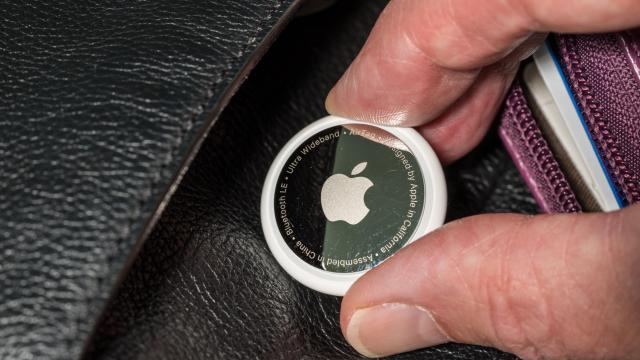Although it’s been more than a year and a half since Apple put its little tracking doohickey called AirTags on the market, the product has been repeatedly abused by stalkers as a way of keeping tabs on targets. This week, Apple silently released details on earlier firmware updates to its AirTags that lets users tell if an unknown AirTag is on your person.
On Wednesday, Apple’s Support page added details about its latest two firmware updates, namely 2.0.24 and 2.0.36. While the latter update says it fixed the AirTags accelerometer not working in “certain scenarios,” the former update is very interesting. The update “enables Precision Finding to help locate an unknown AirTag detected moving with you.” In addition, a user’s iPhone will notify users when an AirTag that’s no longer with its owner is on your person. The iPhone will also emit a sound to make it clear it’s been moved.
Any paired AirTag should automatically download the update when it’s within 10.06 m of Bluetooth range with the iPhone, though the feature only works on iPhone 11, 12, 13, and 14 models. The iPhone also needs to be running iOs 16.2 or later. These updates add to an earlier firmware update that included “tuning the unwanted tracking sound to more easily locate an unknown AirTag.”
The firmware updates were released both last month and this month, according to MacRumors, but it took the company until now to describe what the updates actually did. The feature works using ultra wideband, which means AirTags in countries like Russia, Ukraine, Belarus, Indonesia, and more are still more than capable of keeping tabs on unsuspecting persons. And of course, the feature does nothing for any Android user who might have an AirTag on them. For that, Apple has had to release a separate app.
The first update from last summer made AirTags beep if they were not near the original users’ phone after eight to 24 hours, but obviously this had mixed results. Back in February, Apple made a statement about how they were working to prevent AirTags for “unwanted tracking” The company already touted its “first-ever proactive system to alert you of unwanted tracking,” but users had been complaining about receiving alerts when they borrowed friends’ keys. The tech giant promised more updates to allow users to determine where an unwanted AirTag is on their person.
Ever since they were released as a competitor to the Tile tracking device, critics have questioned just how ripe AirTags were for abuse. A Washington Post article from May 2021 first brought up the question of AirTag stalking, but it’s gotten much worse since then. Motherboard reported in April that they uncovered 50 cases from the eight months prior where women reported being tracked with AirTags. Indianapolis police said back in June that a woman allegedly used AirTags to stalk her boyfriend and later murder him.
Apple has released updates over time to scan for AirTags, but none of those new features have truly depleted the risk of technologically-enabled stalking. A new class action lawsuit filed by two women and stalking victims earlier this month claims the company has been “heedless” in proliferating its AirTags. One of the women in that suit claimed her iPhone alerted her to the AirTag in her vicinity.
What all this shows is how such a relatively innocuous piece of technology can have massive unintended consequences, but Apple’s response to the privacy nightmare it’s created has been slow and piecemeal. While the company touts that it will give up any information to law enforcement regarding tracking, Apple’s strategy puts the onus on regular people to be aware of the technology and actively scan for it on their person.
